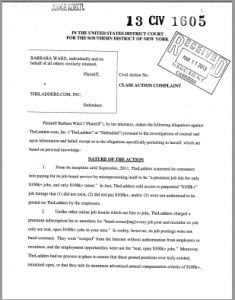In the March 26, 2013 Ask The Headhunter Newsletter, a reader complains about troublesome headhunters:
What’s your advice to someone who is dealing with unwanted cold calls from headhunters?
Somehow my name has been shared around as someone who is looking for a change. (I’m not. If I were, I would be the one making the calls.) I seem to get cold calls at work every other day. E-mails come about once a week, and I get cold calls at home about once every other week. I don’t respond to the e-mails, and my standard answer to the phone calls is, “Sorry, but I’m not currently interested.” Most people accept that at face value so the phone call is all of 30 seconds, but some have become downright rude, saying things like, “Well, if you don’t want to double your salary, that’s not my problem.” Yes, that is a direct quote.
Other than keeping notes about who is acting in an unprofessional manner, do you have any other suggestions? Thanks in advance.
Nick’s Reply
What you’re experiencing is partly a reflection of the economy and partly an display of poor headhunting practices.
 Real headhunters — those who actually work on specific assignments from clients — really are looking for good candidates. If you’re good at what you do and people in your industry know it, these headhunters are getting your name from people they know and trust. It’s possible that several headhunters who are working on a handful of the same positions have all heard about you. That may be one reason you’re getting a lot of calls.
Real headhunters — those who actually work on specific assignments from clients — really are looking for good candidates. If you’re good at what you do and people in your industry know it, these headhunters are getting your name from people they know and trust. It’s possible that several headhunters who are working on a handful of the same positions have all heard about you. That may be one reason you’re getting a lot of calls.
However, my guess is that only a few of those calls are from good headhunters. A good headhunter’s job is to entice, cajole and steal a good worker for his client. But, a good headhunter won’t be rude or pushy about it — and he won’t bother you. If you politely say, “No thanks,” he’ll respect you and leave you alone. He will also ask your permission to stay in touch periodically. My advice is to keep such connections open, and judge the headhunter on how he behaves.
The other class of headhunters — the ones who play “dialing for dollars” — don’t have legitimate search assignments. Their approach is to get someone like you interested in the idea of a new job. All they want is the resume of a good professional. Once they’ve got it, they call companies that may or may not be hiring, and use you as bait to get an assignment. Yours won’t be the only resume they will submit. Their hope is that they might get a hit here and there.
Now, there’s nothing inherently wrong with this. Call it supply-side headhunting, or call it desperation. Some people love it. But, when these guys become a nuisance, it’s time to cut them off.
I like that you keep a list and make notes about who’s good and who’s not. Once you judge someone to be rude, you should have no qualms about just hanging up. This works as well with nasty headhunters as with telemarketers. (If you argue with them, they’ll just keep calling.)
Make a list of questions that you want any headhunter to answer before you’ll even jot down his name. Here’s an important one from How to Work With Headhunters… and how to make headhunters work for you. Put it at the top of your list:
“Can you give me two clients and two candidates as references I can check before we talk further?”
Headhunters who are looking for a warm body will decline, then you hang up. (Some are not even really headhunters.) The ones who provide references are worth putting on your A list. Don’t worry: You won’t get enough legitimate calls that you’ll have to devote much time to this. The hang-ups will be quick and much more frequent. Your A list will be correspondingly short.
You can of course just hang up on everyone soliciting you. But that’s not a great idea — especially in today’s economy.
Do headhunters harass you? How do you decide which ones to talk to, and which to hang up on?
: :




 When it seemed job hunters doubted the database, TheLadders’ chieftain, Marc Cenedella, came up with a claim even stupider than that: TheLadders had experts checking over very single job to make sure they’re always $100K+.
When it seemed job hunters doubted the database, TheLadders’ chieftain, Marc Cenedella, came up with a claim even stupider than that: TheLadders had experts checking over very single job to make sure they’re always $100K+.